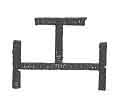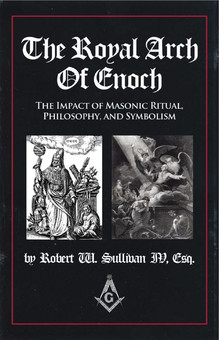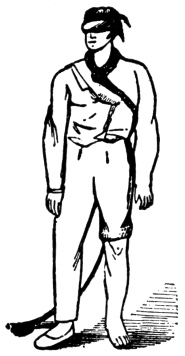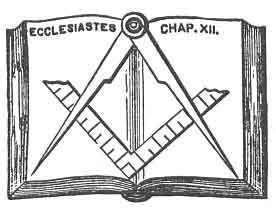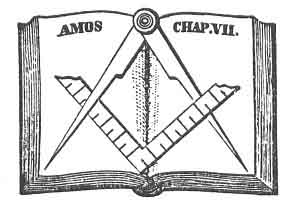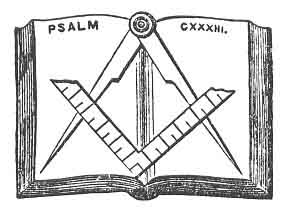Principal Sojourner–Companions, arise and follow me.
He now conducts them once around the Chapter, during which time he reads from the text-book the first six verses of the third chapter of Exodus:–
“Now Moses kept the flock of Jethro his father-in-law, the priest of Midian; and he led the flock to the back side of the desert, and came to the mountain of God, even to Horeb. And the angel of the Lord appeared unto him in a flame of fire out of the midst of a bush; and he looked, and behold, the bush burned with fire, and the bush was not consumed.” &c.
The reading of these verses is so timed, that just when they
p. 232
are finished the candidates have arrived in front of a representation of the burning bush, placed in a corner of the Chapter; when the Principal Sojourner directs them to halt, and slips up the bandages from their eyes.
One of the members now personates the Deity, behind the bush, and calls out, Moses! Moses!
Principal Sojourner (answering for candidates.)–Here I am.
Companion behind the bush–Draw not nigh hither: put off thy shoes from off thy feet, for the place whereon thou standest is holy ground. I am the God of thy fathers, the God of Abraham, the God of Isaac, and the God of Jacob.
Principal Sojourner directs the candidates to kneel, and he covers their faces again, and then says–And Moses hid his face, for he was afraid to look upon God.
Principal Sojourner (to candidates.)–Arise, and follow me.
He then leads them three times around the Chapter, during which time he reads from the text-book 2 Chronicles, ch. xxxvi., vs. 11 to 20:
‘Zedekiah was one-and-twenty years old when he began to reign, and he reigned eleven years in Jerusalem. And he did that which was evil in the sight of the Lord his God, and humbled not himself before Jeremiah the prophet, speaking from the mouth of the Lord. And he also rebelled against King Nebuchadnezzar, and stiffened his neck, and hardened his heart from turning unto the Lord God of Israel. Moreover, all the chief of the priests and the people transgressed very much, after all the abominations of the heathen, and polluted the house of the Lord, which he had hallowed in Jerusalem. And the Lord God of their fathers sent to them by his messengers, because he had compassion on his people, and on his dwelling-place. But they mocked the messengers of God, and despised his Word, and misused his prophets, until the wrath of the Lord arose against his people, till there was no remedy. Therefore he brought upon them the King of the Chaldees, who slew their young men with the sword, in the house of their sanctuary, and had no compassion upon young men or maidens, old men, or him that stooped for age; he gave them all into his hand. And all the vessels of the house of God, great and small, and the treasures of the house of the Lord, and the treasures of the king, and his princes; all these he brought to Babylon. And they burnt the house of God, and brake down the wall of Jerusalem, and burnt all the palaces thereof with fire, and destroyed all the goodly vessels thereof. And them that had escaped from the sword carried he away to Babylon; where they were servants to him and his sons, until the reign of the kingdom of Persia.”
p. 233
When the Principal Sojourner arrives at that part of the above reading which alludes to the Chaldees killing the young men with the sword, the companions of the Chapter begin to make all sorts of queer and unearthly noises, such as rolling cannon-balls on the floor, clashing old swords, shouting, groaning, whistling, stamping, throwing down benches, &c. This noise continues during the remainder of the reading, the object being to represent the siege and destruction of Jerusalem. During this confusion the three candidates are seized, thrown upon the floor, bound hand and foot, and carried bodily into the preparation-room, when the door is closed.
In a few minutes the companions begin to shout: “Hurra for the captives!” repeating it several times.

Moe is the founder of GnosticWarrior.com. He is a father, husband, author, martial arts black belt, and an expert in Gnosticism, the occult, and esotericism.

